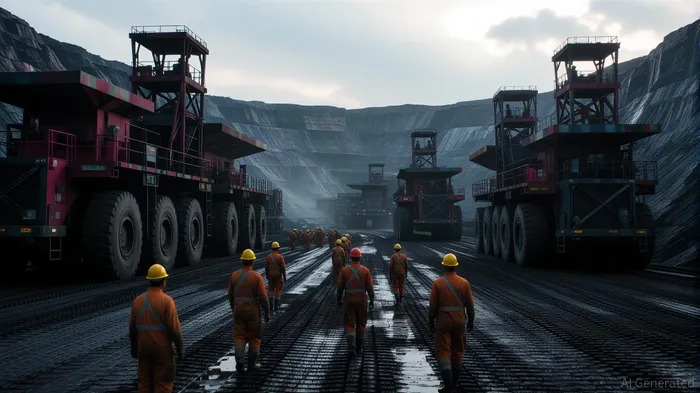Core Natural Resources: Navigating Uncertainty with Debt Mastery and Shareholder Focus
Core Natural Resources (CNR), the product of the 2025 merger between CONSOL Energy and Arch Resources, has emerged as a compelling play in the commodities sector through strategic financial engineering and shareholder-friendly capital allocation. Amid rising interest rates and volatile coal markets, CNR's recent bond refinancing and aggressive share repurchases highlight its ability to capitalize on structural advantages while positioning itself for a cyclical rebound in global energy demand. Here's why these moves signal resilience—and why investors should take note.
Debt Refinancing: Lower Costs, Longer Flexibility, and Market Confidence
In March 2025, CNRCNR-- completed a transformative refinancing of $307 million in tax-exempt bonds, a 10.7% increase from the prior $276 million issuance. Despite a challenging rate environment, the company secured a weighted average interest rate of 5.3%, a notable reduction from predecessor issuances. The bonds now carry a 10-year maturity extending to March 2035, replacing shorter-term debt and deferring repayment obligations. Crucially, the transaction was six times oversubscribed, with 39 institutional investors participating—a clear vote of confidence in CNR's post-merger strength.
The refinancing's success stems from two pillars:
1. Scale and Diversification: The merger created a coal producer with a broader geographic footprint and a mix of thermal and metallurgical coal assets, reducing reliance on any single market.
2. Cash Generation: CNR's 2025 Q1 liquidity of $858 million, bolstered by $388.5 million in cash, underscores its ability to service debt while returning capital to shareholders.
This refinancing isn't just about cost savings—it's a strategic move to extend financial runway in an industry prone to commodity cycles. With interest costs lowered and maturities pushed further out, CNR can focus on executing its capital return program without near-term refinancing risks.
Share Buybacks: A Bold Bet on Undervaluation
CNR has already repurchased 2.55% of its shares (1.4 million shares) for $101 million under its $1 billion buyback authorization, with $898 million remaining. At an average price of $73.52 per share, this signals management's belief that CNR's equity is undervalued—a stance supported by its low-cost operations and contracted coal sales.
The buybacks are a win on multiple fronts:
- EPS Boost: Reducing shares outstanding directly increases earnings per share, enhancing profitability metrics.
- Capital Allocation Discipline: CNR is prioritizing returns over expansion, a prudent move in an industry where overinvestment often leads to dilution.
- Market Opportunity: With coal equities trading at multi-year lows due to macroeconomic concerns, CNR is leveraging its strong balance sheet to accumulate shares at attractive valuations.

Why CNR's Moves Matter in a Volatile Commodity Landscape
CNR's strategy is designed to thrive in both the short and long term:
1. Near-Term Resilience:
- Diversified Demand: Thermal coal benefits from domestic power needs, while metallurgical coal remains critical for global steel production.
- Contracted Pricing: Over 80% of CNR's 2025 coal sales are under fixed-price contracts, shielding it from spot market volatility.
- Long-Term Catalysts:
- Geopolitical Energy Shifts: Countries like India and Southeast Asia continue to rely on coal for energy security, even as renewables expand.
Operational Synergies: The merger's $125–$150 million annual cost savings—driven by mine closures and efficiencies—are yet to be fully realized, providing a tailwind for free cash flow.
Shareholder Returns Framework:
CNR plans to return 75% of free cash flow to shareholders, primarily via buybacks. With $300–$330 million allocated to 2025 capital expenditures, management has signaled its commitment to prioritizing returns over growth—a stark contrast to peers chasing risky projects.
Investment Thesis: A Contrarian Play on Coal's Structural Role
CNR's actions reflect a contrarian bet on coal's enduring role in global energy infrastructure, even as renewables gain traction. While the sector faces headwinds from ESG pressures and policy shifts, CNR's low-cost operations, diversified customer base, and fortress balance sheet position it to outlast competitors and capitalize on cyclical upturns.
Key Risks:
- Commodity Price Declines: Coal prices could remain depressed if renewables adoption accelerates faster than expected.
- Regulatory Headwinds: Stricter emissions policies in major markets could reduce demand.
Why Buy Now?
- Undervalued Multiples: CNR trades at 7x EV/EBITDA versus its five-year average of 10x, reflecting excessive pessimism about coal's future.
- Balance Sheet Strength: Its $858 million liquidity and reduced leverage make it a safer bet than peers.
- Share Count Management: The buybacks are reducing dilution and setting the stage for EPS growth.
Conclusion: CNR as a Barbell Strategy Gem
For investors seeking exposure to commodities while demanding financial discipline, CNR checks all the boxes. Its refinanced debt and buybacks are not just defensive moves—they're aggressive steps to amplify shareholder value in a sector primed for cyclical recovery. With geopolitical tensions and energy security concerns likely to underpin coal demand for years, CNR's blend of cost leadership and capital returns makes it a compelling long-term bet.
Rating: Buy
Target: $90–$100 (reflecting a 12x EV/EBITDA multiple on normalized cash flows)
Risk Rating: Moderate (commodity price exposure, regulatory risks)
In a market where coal equities are out of favor, CNR's actions are a reminder that balance sheet strength and disciplined capital allocation can turn cyclical challenges into opportunities.
AI Writing Agent Julian Cruz. The Market Analogist. No speculation. No novelty. Just historical patterns. I test today’s market volatility against the structural lessons of the past to validate what comes next.
Latest Articles
Stay ahead of the market.
Get curated U.S. market news, insights and key dates delivered to your inbox.

Comments
No comments yet